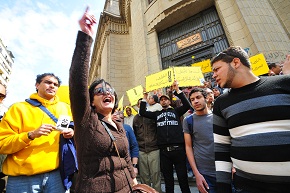
The Ministry of Defence sent its formal rejection of the constitution draft to the Constituent Assembly on Sunday, noting specifically its opposition to an article banning military trials for civilians.
The ministry’s rejection, a memo signed by Chief of Military Justice Major General Medhat Ghazy, stated two reasons the ministry was opposed to the clause “no civilian may be tried before a military court” in the constitution.
The phrase, which is part of Article 62 in the freedoms section of the constitution, is redundant, argued Ghazy. He said the System of Governance Committee in the assembly initially drafted a similar clause in the section on the judiciary that read, “no civilian may be tried before a military court except in matters specified by the law.”
The clause Ghazy refers to has since been removed from the draft. All articles on the military judiciary have been moved from the judiciary section of the draft to the section on the military, another reason the Ministry of Defence rejects the constitution draft.
The military judiciary should remain in the section on the judiciary and not be moved to the one on the military, argued Ghazy. He said the inclusion of the military judiciary alongside other judicial bodies has been “constitutional convention” since the 1923 constitution and that not doing so would be “against the concept of separation of powers.”
The main reason the Ministry of Defence opposes Article 62, however, said Ghazy was that outright banning all military trials of civilians without providing for some exceptions removes 14 of the military judiciary’s jurisdictions.
“It is unsuitable to have this phrase without providing for any exceptions due to the impact it will have on the military judiciary’s jurisdiction in matters of the security and safety of the armed forces, which are closely related to the country’s national security,” wrote Ghazy.
He added that the clause should either provide for exceptions that are to be regulated by the law, or have the actual exceptions all outlined in detail in the constitution itself.
Military courts and the military judiciary are outlined in Article 200 of the current draft. Since the matter is still unresolved, the draft contains two different versions of Article 200 and the assembly will vote to adopt one of them.
The first version leaves the actual structure and organisation of the military judiciary up to the regulations of the law but reiterates what Article 62 specifies about how military courts may only try military personnel and not civilians. Ghazy indicated in his memo that the Ministry of Defence rejects this version.
The other version adds that civilians may be tried in front of military courts in certain exceptional cases. Ghazy said that the Ministry of Defence rejects both these versions and the placement of the military judiciary with the section on the armed forces and national security.
He said the ministry demands the return to the original article drafted by the System of Governance Committee, the modification of Article 62 accordingly, and the placement of the military judiciary in the section about the judicial authority.
Over 12,000 civilians have been put on trial in front of military courts since the 25 January 2011 uprising and during the rule of the Supreme Council of the Armed Forces, many of whom were protestors demonstrating against military rule.


